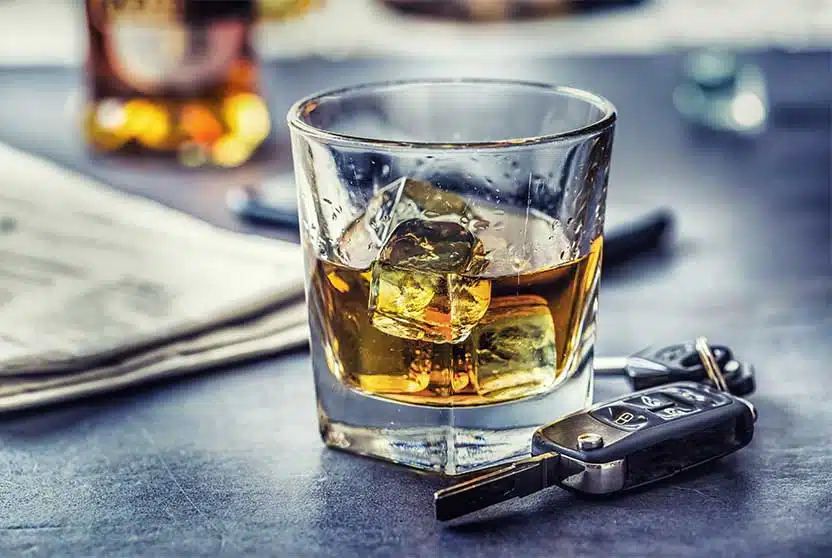Is A DUI Charge A Sign Of Alcohol Addiction?

Each day, about 32 U.S. residents die in drunk driving crashes. Because drinking and driving is so dangerous, offenders will face a DUI (driving under the influence) charge.
If you or someone you love has recently been charged with a DUI, you may wonder if it’s a sign of alcohol use disorder. While a single DUI could simply be one bad decision, having multiple DUI convictions is a potential warning sign of alcohol addiction.
Understanding DUI Charges
For most drivers, it’s illegal to drive with a blood alcohol concentration (BAC) of 0.08 percent or higher. This limit drops to 0.02 percent for drivers under 21 and 0.04 percent for drivers of commercial vehicles (such as school buses).
Drivers who exceed these limits risk a DUI arrest. To determine a person’s BAC, law enforcement officers typically use breathalyzer tests. A breathalyzer is a device that detects your BAC by measuring the amount of alcohol in the air you breathe out.
Some officers also use field sobriety tests, which can detect intoxication by testing your balance, coordination, and ability to follow instructions.
Possible Penalties
In some states, including Massachusetts, other names for a DUI charge include DWI (driving while intoxicated) and OUI (operating under the influence). If the charge leads to a conviction, possible penalties include:
- fines
- driver’s license suspension
- ignition interlock devices, which are small breathalyzers that prevent your car from starting unless your BAC is under a certain limit (usually 0.02%)
- jail time
The specific penalties depend on your BAC, the amount of charges you have faced, whether there were any fatalities, and other factors.
Is A DUI Charge A Sign Of Alcohol Addiction?
In 2020, 18.5 million U.S. citizens aged 16 and older reported driving under the influence of alcohol. While some of them had alcohol addiction, others simply made a poor choice by getting behind the wheel while drunk.
In other words, a single DUI is not always a sign of alcohol addiction. However, repeat offenses are another matter.
People with multiple DUI convictions have repeatedly chosen to drink in dangerous situations. This is a common warning sign of alcohol addiction.
Screening For Alcohol Addiction
Many people who are convicted of a DUI will be screened for alcohol addiction. That means an addiction specialist will interview the person about their drinking habits. This screening helps the court decide whether the person requires addiction treatment.
In some cases, convicted DUI offenders must complete addiction treatment to have their driving privileges restored. Other times, the court will order treatment as an alternative to jail time.
Other Signs Of Alcohol Addiction
The most common signs of alcohol addiction include tolerance and physical dependence. Tolerance means your body gets used to the effects of alcohol over time. You then need increasingly larger or more frequent drinks to feel the desired effects.
Physical dependence means your body starts relying on alcohol to function. If you stop drinking, you may experience withdrawal symptoms such as:
- anxiety
- mood swings
- shaking
- sweating
- fatigue
- nightmares
Some people also experience more serious symptoms, including seizures, severe confusion, and hallucinations (seeing, hearing, or feeling things that aren’t there). These symptoms require immediate medical attention.
Along with tolerance and physical dependence, other common signs of alcohol addiction include:
- craving alcohol frequently
- feeling unable to stop or cut down on your drinking
- experiencing problems in your personal or professional life due to your drinking habits
- neglecting activities you once enjoyed so you can spend more time drinking
- drinking in dangerous situations, such as while driving, swimming, or using machinery
- continuing to drink despite negative consequences, such as damaged relationships, job loss, or health problems
Alcohol Addiction Treatment
If you or a loved one shows signs of alcohol addiction, seek help at an addiction treatment program.
Some programs are inpatient, meaning you live at the treatment center and receive constant care. Other programs are outpatient, meaning you live at home and regularly visit the treatment center. Both types of programs offer treatments such as:
- medical detox, in which doctors help you get alcohol out of your system with minimal withdrawal symptoms
- behavioral therapy, in which a mental health professional helps you change unhealthy behaviors and beliefs that contribute to your alcohol abuse
- medication-assisted treatment, in which doctors prescribe medications to ease alcohol cravings and withdrawal symptoms
- support groups, in which you can discuss your experiences and coping strategies with other people recovering from alcohol addiction
- aftercare planning, in which your treatment team identifies strategies to reduce your risk of relapse, such as ongoing therapy, support groups, and assistance with education, employment, or housing
To learn more about alcohol treatment, please reach out to Spring Hill Recovery Center. Nestled in peaceful woodlands, our substance abuse and addiction treatment programs offer personalized, evidence-based care to help you or your loved one stay sober.
- Centers for Disease Control and Prevention — Impaired Driving: Get the Facts https://www.cdc.gov/transportationsafety/impaired_driving/impaired-drv_factsheet.html
- Commonwealth of Massachusetts — Massachusetts law about drunk or drugged driving https://www.mass.gov/info-details/massachusetts-law-about-drunk-or-drugged-driving
- National Highway Traffic Safety Administration — Drunk Driving https://www.nhtsa.gov/risky-driving/drunk-driving
- National Institute on Alcohol Abuse and Alcoholism — What are the symptoms of alcohol use disorder (AUD)? https://www.rethinkingdrinking.niaaa.nih.gov/How-much-is-too-much/whats-the-harm/what-Are-Symptoms-Of-alcohol-Use-Disorder.aspx
- National Library of Medicine: MedlinePlus — Alcohol withdrawal https://medlineplus.gov/ency/article/000764.htm


